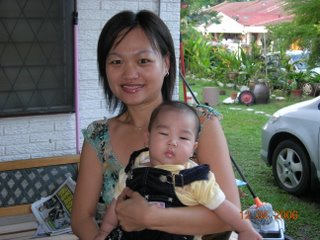Monday, October 30, 2006
An Hour Gained
30-OCT-2006:
Yesterday was when the clock was changed because of daylight saving time.
Yesterday was when the clock was changed because of daylight saving time.
In the European Union, Summer Time begins and ends at 1:00 a.m. Universal Time (Greenwich Mean Time). It begins the last Sunday in March and ends the last Sunday in October. In spring, clocks spring forward from 12:59 a.m. to 2:00 a.m.; in fall, clocks fall back from 1:59 a.m. to 1:00 a.m. So as we were in slumberland, an hour was gained through the night. As usual, Dominic woke up at 6:30am (which was actually 5:30am because of the change). And me, who was usually quite blur, had no idea that the clock had fallen back 1 hour. I did my regular chores as usual and after that we went out. On the train, a woman asked me what time it was. She was extremely shocked when I told her it was half past 12. "Past 12??!!", she exclaimed. And I still had no idea that I was one hour in advance of everybody. We reached home at 5pm, turned on the radio and the DJ told us that it was 4pm. Well, we knew that the time was going to be changed that week but we didn't know when exactly. So it didn't really come as a big surprise. And so from then onwards, we had an extra hour and it was so weird. By 5pm, we were already hungry. By 8pm, we were already in bed! I thought that it would be so nice if I can get an extra hour every evening ... so that I can spend more time with SM. The next morning, Dominic woke up at 5:30am! It was funny that he didn't need a clock and he knew exactly when to wake up - i.e. 6:30am (his time). I took the whole day to adjust his time and the next day, he woke up at 6:30am as usual. So, I was wondering if someone was working a night shift, does this mean he had to work that additional hour in October? Finally, here's a summary of what I found out about Daylight Saving Time. The main purpose of Daylight Saving Time (called "Summer Time" in many places in the world) is to make better use of daylight. We change our clocks during the summer months to move an hour of daylight from the morning to the evening, i.e. there is more light in the evenings / can do more in the evenings. However, Daylight Saving Time also saves energy. Energy use and the demand for electricity for lighting homes is directly related to the times when people go to bed at night and rise in the morning. A good percentage of energy consumed by lighting and appliances occurs in the evening when families are home. By moving the clock ahead one hour, the amount of electricity consumed each day decreases, as a result of having more sunlight in the evening.
